
Fast, affordable Internet access for all.

Advocates for better Internet access are breathing a sigh of relief in New York as the State Assembly passed a budget bill yesterday that did not include an amendment that would have undermined the state’s municipal broadband grant program.
As we reported last month, buried in language near the bottom of the Assembly budget proposal was a Trojan horse legislative sources said was being pushed by lobbyists representing Charter Spectrum.
The amendment, which did not survive the budget reconciliation process, proposed to limit Municipal Infrastructure Program grants to projects that targeted “unserved and underserved locations only” – a restriction that would have made municipal broadband projects in the state less likely to become financially viable.
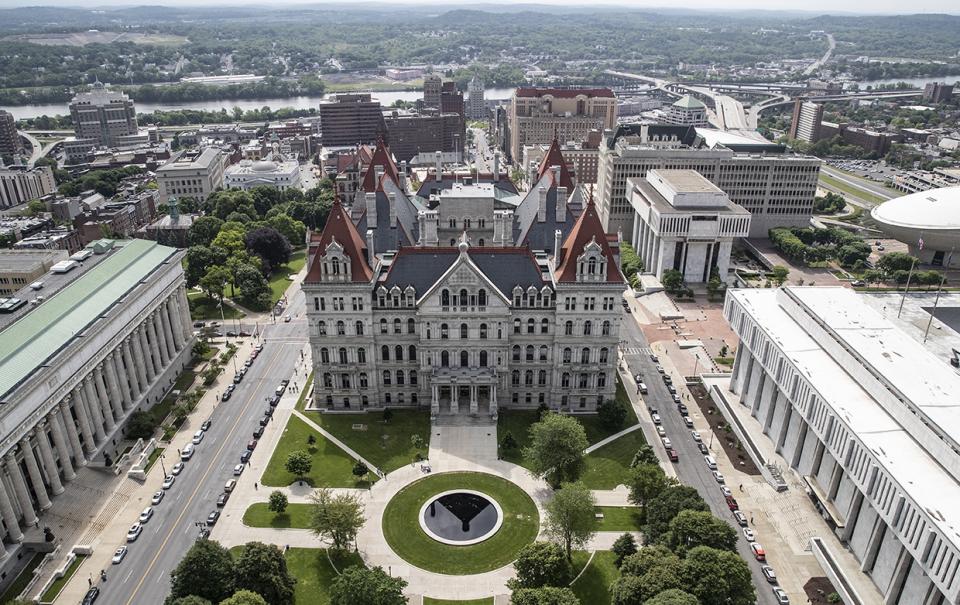
Created as part of New York’s billion dollar ConnectALL Initiative, the MIP is specifically designed to support municipal broadband projects. Such projects are routinely targeted by lobbyists for the big monopoly providers intent on preventing any competition to their often spotty, high-cost service offerings.
Language added to a New York State budget bill is threatening to undermine a municipal broadband grant program established by Gov. Kathy Hochul’s office earlier this year.
Known as the Municipal Infrastructure Program, it was designed to provide grant funding for municipalities in the state eager to build publicly-owned, locally controlled broadband infrastructure as a way to ensure ubiquitous, affordable access to high-quality Internet after decades of frustration with expensive, spotty and uneven service from the regional monopolies.
Currently, New York state lawmakers are in the midst of budget proposal season in which the Governor’s office and both legislative chambers (the state Senate and Assembly) have until April 1 to reconcile and complete a final budget for the upcoming fiscal year.
Buried near the bottom of the Assembly budget proposal (A8805B) is a Trojan horse legislative sources say is being pushed by lobbyists representing Charter Spectrum, the regional cable monopoly and 2nd largest cable company in the U.S. that was nearly kicked out of New York by state officials in 2018 for atrocious service.
The rocky rural hills of West Virginia are a formidable foe when it comes to building high-speed Internet infrastructure that offers affordable high-quality service.
Nobody knows that better than Hardy Telecommunications (OneNet), a small community-owned cooperative that delivers affordable fiber to frustrated locals deemed too costly and cumbersome to be served by the incumbent telecom giants.
The cooperative serves parts of four counties (Hardy, Pendelton, Grant, and Hampshire). It connected its first fiber customer in 2013, after receiving $31.6 million in federal BTOP funding. Since then, the cooperative tells ILSR they’ve spent $20 million of their own funds to bring fiber to rural corners of the aptly-named Mountain State.
Derek Barr, Assistant General Manager at Hardy Telecommunications, says the cooperative currently delivers broadband service to 5,050 rural subscribers – 4,736 of which are on fiber lines that simply wouldn’t exist without federal funding programs. Hardy Telecommunications also provides 68 customers with fixed wireless access (FWA) broadband service.
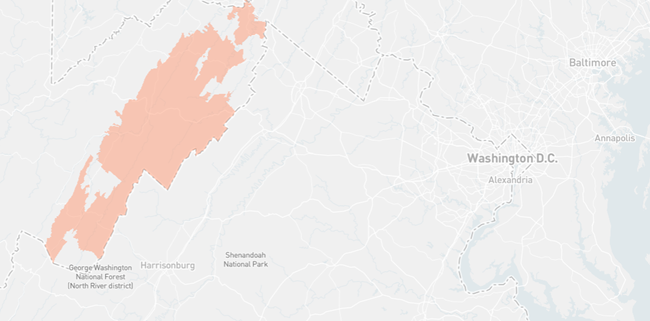
“Our focus is fiber, and we're trying to build out fiber as much as we can,” Barr tells ILSR. “But it's very tough in our serving region. It's all mountains and a lot of trees, and a big chunk of our area is either state park or national forest land. It's also very hard to do fixed wireless because even if it might work in the winter, it's not going to work in the summer” when tree leaves block line of sight, he noted.
So the cooperative slowly and consistently expands fiber as it can, often in partnership with Pendleton County. As a result, locals have the option of a variety of double and triple play phone, cable, and fiber options, starting with a symmetrical 100 Mbps (megabit per second) downstream, 50 Mbps upstream fiber and phone bundle for $79 a month.
As the new year begins, the Institute for Local Self-Reliance (ILSR) announced today its latest tally of municipal broadband networks which shows a dramatic surge in the number of communities building publicly-owned, locally controlled high-speed Internet infrastructure over the last three years.
Since January 1, 2021, at least 47 new municipal networks have come online with dozens of other projects still in the planning or pre-construction phase, which includes the possibility of building 40 new municipal networks in California alone.
A looming new bill by Republican Kentucky State Senator Gex Williams could undermine decades of broadband progress made in the state’s capital city by a popular locally-owned utility, Frankfort Plant Board (FPB).
Home to 28,000 Kentuckians, local residents and utility officials in Frankfort are incensed at the bill, which they believe will unnecessarily result in higher rates, fewer jobs, and less broadband competition overall.
Williams is circulating a bill in the Kentucky state legislature that, if passed, would force FPB to sell its broadband division to a private-sector company and subject it to more stringent oversight requirements. In guest editorials circulated in the local press, Williams insists his goal is to “rein in” the FPB, which he deems part of a “runaway” government that lacks accountability.
But there’s no evidence for Williams’ allegations of limited accountability, and locals and activists alike believe that the legislator is simply running interference for regional broadband monopolies upset by the added competition created by the popular, publicly-owned utility.
Another Community-Owned Solution Addressing Market Failure
Like many local U.S. communities, Frankfort sees a notable dearth of meaningful broadband competition, resulting in patchy broadband coverage, slow speeds, high prices, and abysmal customer service. Enter the Frankfort Plant Board, which has been deploying affordable fiber access across the community under the NEXTBAND brand.
As we approached the new year, and after more than a decade of criticism, the FCC finally moved to tackle the agency’s long-dated definition of broadband with an eye on nudging the industry toward faster broadband deployments. But many industry watchers say the belated reform inquiry arrives late and long after other agencies have filled the void left by a lack of FCC leadership.
The FCC’s Notice of Inquiry (NOI), issued in November, asks whether the agency should finally adopt 100 Mbps (megabit per second) downstream, 20 Mbps upstream as the new standard U.S. definition of broadband.
“Ultimately, I believe it is essential in the United States to set big goals in order to get big things done,” FCC boss Jessica Rosenworcel said in a statement. “That is why we are kicking off this inquiry to update our national broadband standard to better align it with the standards in pandemic-era legislation of 100 Megabits per second down and 20 Megabits per second up and also set a long-term goal for gigabit speeds.”
But there’s nothing about the FCC’s planned definition that’s “big.”
Of particular annoyance to long-time industry watchers is the agency’s continued adherence to an upstream standard that remains out of touch with modern needs. While Senators and consumer groups had pushed for a symmetrical definition of 100 Mbps, cable industry lobbyists managed to convince the FCC to lower the upstream bar dramatically.
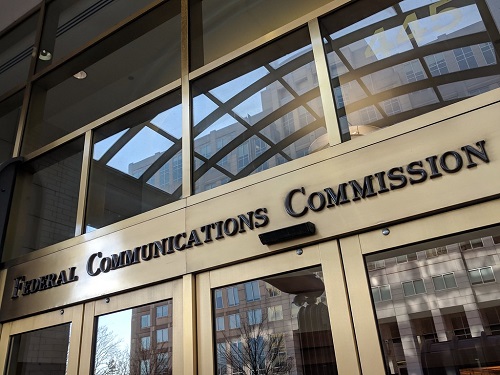
Cable broadband speeds are notoriously topheavy, with downstream speeds far in excess of upstream speeds. While full duplex DOCSIS technology is supposed to eventually remedy that, the technology remains far from widespread deployment.
Both the Sagamore Bridge and Railroad Bridge that span opposite ends of the Cape Cod Canal carry the kind of traffic that terrifies Comcast and Verizon.
The 576 count fiber-optic strand strung across the Railroad Bridge in Buzzards Bay – and the 864 strand that crosses the Sagamore Bridge – belongs to OpenCape, an open-access “middle mile” network ushering the gold-standard of Internet connectivity into parts of each of the Cape’s 15 towns.
It’s an extension of OpenCape’s fiber network, lashed to utility poles in dozens of communities across southeastern Massachusetts, all of which connect the region to the nation’s Internet backbone/long haul network.
Middle mile networks are a key part of the Internet’s connective tissue that dramatically lowers the cost for Internet service providers (ISPs) to deploy “last mile” connections to individual homes and businesses.
Thanks to a federal grant courtesy of the American Recovery and ReInvestment Act, the nonprofit fiber network was established in 2009 and since then has been providing Internet connectivity to most of the region’s anchor institutions – hospitals, public safety facilities, numerous libraries, schools, banks, and dozens of other enterprise clients with big data needs such as the Marine Biological Laboratory and the Woods Hole Oceanographic Institution in Falmouth.
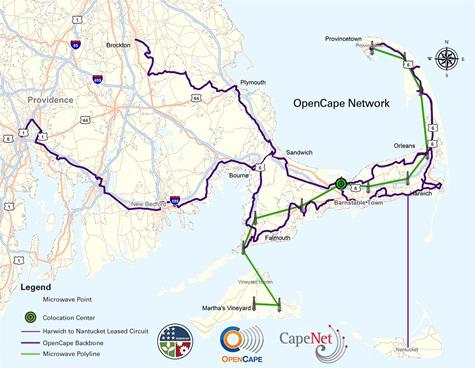
Over the past several years OpenCape has deployed fiber deeper into the region, expanding the network from an initial 350 miles to 650 miles of fiber today, serving a growing number of Main Street businesses across the Cape.
As the National Telecommunications and Information Administration (NTIA) continues to move forward in administering the single biggest federal investment to expand high-speed Internet access in U.S. history, each state and U.S. territory is wrestling with how to best spend the windfall as they lay out their Five Year Action Plans and Initial Proposals necessary to claim their portion of the $42.5 billion BEAD program.
One major barrier to providing universal access to fast, reliable and affordable Internet service–long recognized by ILSR, telecom experts, and a growing number of ordinary citizens–are the monopoly-friendly preemption laws that either outright ban or erect insurmountable barriers to building publicly-owned, locally-controlled broadband networks, aka municipal broadband.
Preemption in the BEAD Era
Currently, 17 states have such preemption laws, most of which have filed their Five Year Action Plans and/or their Initial Proposals. In each of those states, at the behest of Big Cable and Telecom incumbents, state lawmakers have erected legislative barriers to municipal broadband to protect the monopoly players from competition, which is at the very heart of why the digital divide exists in the first place and why tens of millions of Americans suffer from the slower speeds and higher costs that go hand in hand with monopoly service.
Decorah, Iowa is moving forward on a long-percolating plan to expand the city’s core fiber ring to provide affordable broadband access to long-neglected residents and businesses.
While the project has been discussed for years, local officials tell ISLR the project gained renewed momentum during peak COVID, and is creeping closer to launch.
Contracts are still being finalized as the city hopes to spend somewhere around $12 to $15 million to deliver fiber to all 3,000 potential subscriber locations. The full project would take about three years to deliver fiber to all 7,740 city residents, with the first subscribers potentially coming online this fall.
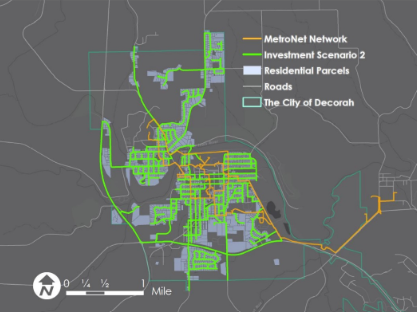
“Decorah has been in pursuit of fiber to the premises for the last 8 to 9 plus years and we finally have broken through some of our challenges on how to get to the finish line,” Chopper Albert, Decorah IT Director told ISLR.
According to Albert, Decorah’s recent progress is thanks in part to new City Manager Travis Goedken, who has long advocated for expanding the city’s existing fiber network to drive affordable fiber access citywide.
New City Management Team Pushes Forward
Since 2013 the city has owned an 11-mile core fiber network, dubbed the Decorah MetroNet. MetroNet was born out of frustration after a major flood in 2008 across much of Iowa resulted in prolonged communications network outages.
MetroNet (not to be confused with the Indiana-based ISP that goes by the same name) currently provides access to Luther College and 18 additional government buildings and anchor institutions.
After years of strategizing, Waterloo, Iowa officials announced in February that they were moving forward with their plan to create a new utility aimed at delivering affordable fiber to every last city resident. While the resulting network is still very much in the planning and construction phase, officials this month released a new website for the project revealing service pricing.
According to the Waterloo telecommunications board, locals will have access to symmetrical 300 megabit per second (Mbps) service, symmetrical 1 gigabit per second (Gbps) service, and symmetrical 10 Gbps service for $50 a month, $70 a month, and $110 a month, respectively. The offerings will see no long-term contracts or usage caps.

Unlike many municipalities, Waterloo is also offering both phone and television bundles. Phone and TV service bundled with 1 Gbps service will cost locals $180 per month, while phone and TV service bundled with 10 Gbps service will be $224 per month.
Andy Van Fleet, chairperson of the board of trustees, tells the Waterloo Cedar Falls Courier that the pricing is notably lower than the prices charged by regional cable monopoly Mediacom. Van Fleet told the paper that Mediacom currently charges him $129 a month for 300 Mbps service, plus the added costs incurred by technically unnecessary usage caps and overage fees.